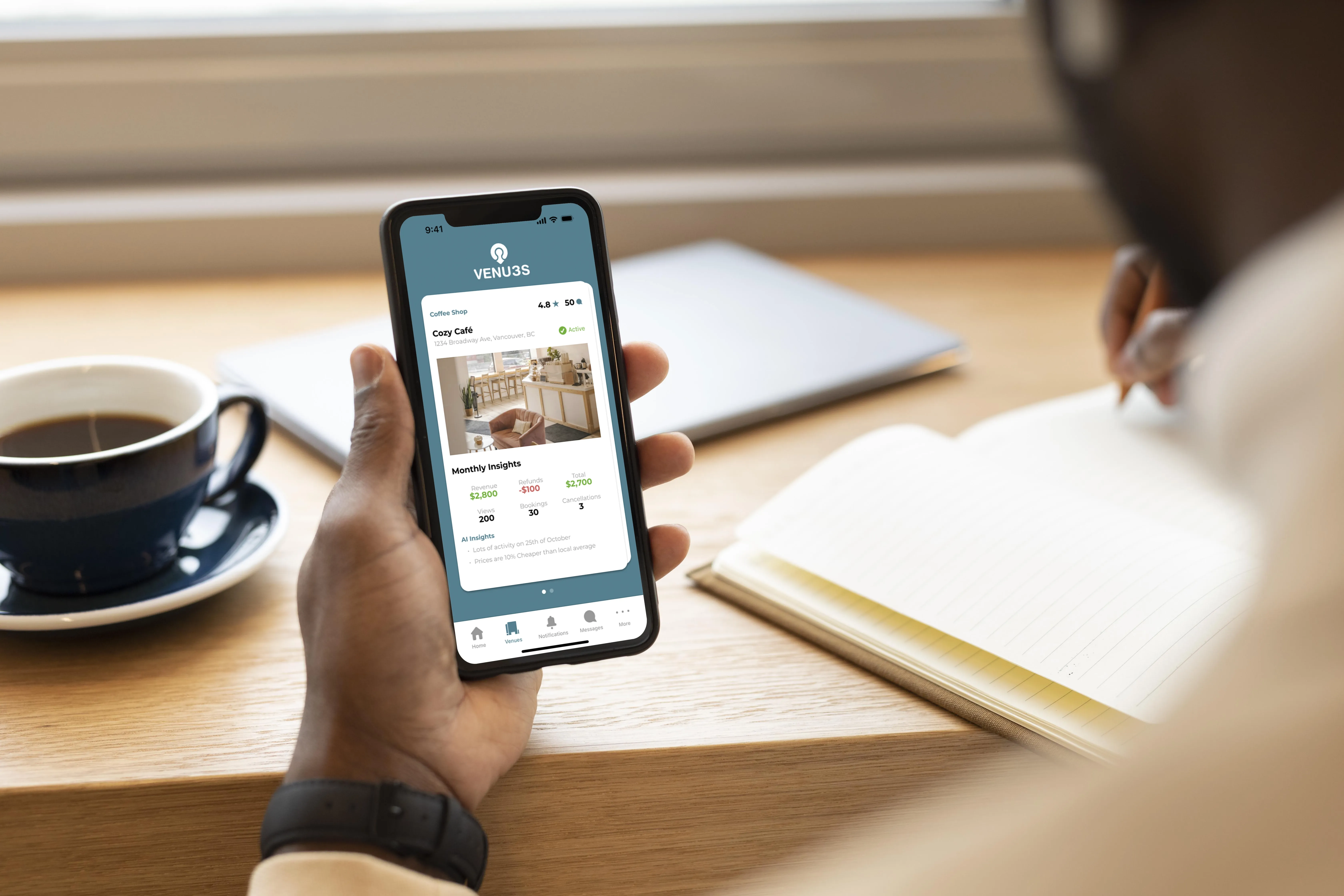
Venu3S
Timeline
July 2025 - PresentRole
Type
Venu3S
What if event organizers could find and book affordable venues in minutes instead of hours?
The event industry struggled with fragmented venue discovery, complex booking processes, and lack of transparency in pricing and availability, creating friction for both event organizers and venue owners.
Platform at a Glance

Venue setup screen for managing venue descriptions and details
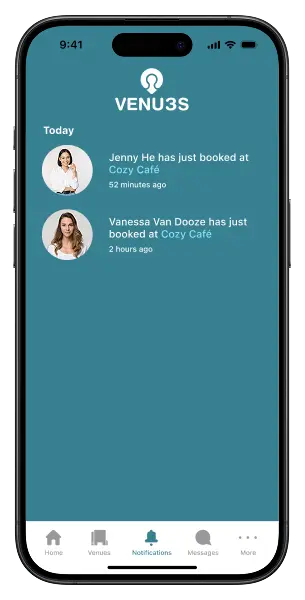
Booking notifications and alerts for venue owners

Message conversations between event organizers and venue owners
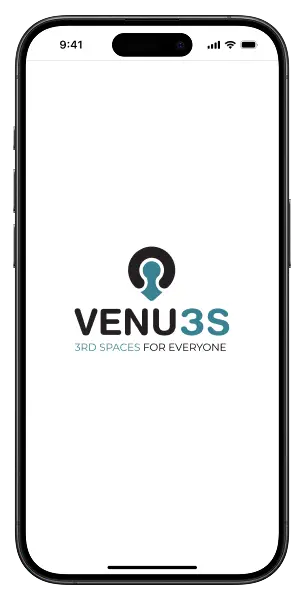
Venu3S loader screen with branding and animation on app launch
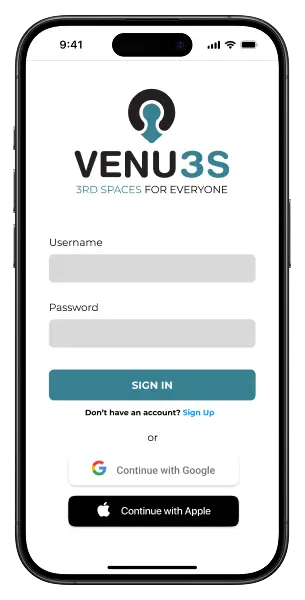
Sign in/sign up screen with email/password and Google/Apple authentication options
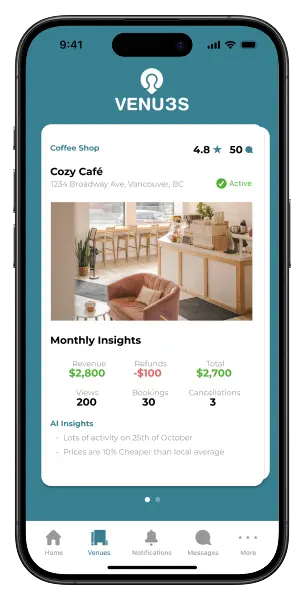
Overview of bookings and finances for venue owners
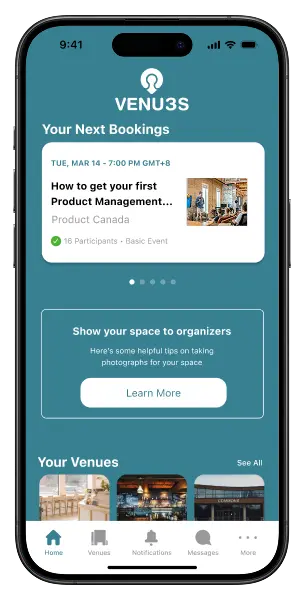
Venue owner home screen with upcoming bookings, tips, and quick access to venues
CONTEXT
Context & Goals
The event industry struggled with fragmented venue discovery, complex booking processes, and lack of transparency in pricing and availability, creating friction for both event organizers and venue owners.
Our Goals
Streamline Discovery
Create intelligent venue matching based on event requirements and preferences
Simplify Booking
Build seamless transaction flow from inquiry to contract completion
Increase Transparency
Provide clear pricing, availability, and venue capabilities information
The Problem
Inefficient Venue Discovery
Event organizers waste 40+ hours searching for venues through outdated websites, phone calls, and email chains, while venue owners struggle to efficiently manage inquiries and optimize their booking rates.
THE PROCESS
Design Process
Conducted extensive user research with event planners and venue operators, developing a two-sided marketplace that prioritizes user experience while creating sustainable value for both parties.
Event Organizer Insights
Conducted interviews with 5 event organizers to understand their pain points. Key finding: consistency in attendance is critical for event success. Organizers need affordable venues that don't require passing high costs onto attendees, which would hurt regular attendance.
Venue Owner Needs
Venue owners want advance notice for proper staffing and prefer groups that aren't too large due to insurance coverage concerns and potential damage to their space. They're looking for consistent, manageable bookings rather than unpredictable walk-in traffic.
Market Landscape
Analyzed competitors including Airbnb (focused on accommodation, not events) and Giggster (direct competition but US-focused). Identified opportunity for a Canadian-based alternative that focuses on casual, affordable spaces rather than formal event venues.
Core User Flows
Mapped out essential user journeys including Login & Sign Up, Search, Browse, Book, and Confirm. Designed hi-fidelity mockups for mobile app showcasing the complete booking experience from discovery to confirmation.
Target Audience
Focusing initial launch on tech community and hobby groups in Canada. These communities value consistent meetup spaces and are willing to book in advance, aligning well with venue owner needs for predictable scheduling.
Intelligent Suggestions
Planning AI-powered matching system that considers group size, location preferences, amenities needed, and budget constraints. The system will learn from booking patterns to suggest venues that match specific event types and community preferences.
For Event Organizers
Access to affordable, casual venues that won't break the budget. Consistent spaces for regular meetups, transparent pricing, and easy booking process that respects organizers' need to maintain regular attendance without passing on high venue costs.
For Venue Owners
Increased foot traffic with advance notice for proper staffing. Manageable group sizes that fit within insurance coverage. Regular, predictable bookings from community groups. Opportunity to earn additional revenue during typically slow periods.
THE IMPACT
Impact & Results
Currently in the ideation and design phase, Venu3S is being developed as a Canadian-owned alternative to address the gap in affordable venue booking for community groups and small businesses. The platform aims to create a sustainable marketplace connecting event organizers with casual venues.
User Interviews
Event organizers and venue owners interviewed to validate problem space
Market Opportunity
Canadian venue booking market potential
Mobile-First
Designed for on-the-go booking and venue management
KEY LEARNINGS
Key Learnings
Design Insights
Visual and interaction design learnings
•Visual venue browsing with high-quality imagery drives initial engagement and conversion
•Simplified filtering that balances comprehensiveness with ease of use is critical for user adoption
•Mobile-first design essential as many venue decisions are made during site visits
•Trust signals like reviews, verification badges, and transparent pricing reduce booking friction
Product Insights
Why this approach is valuable
•Two-sided marketplaces require careful balance between supply and demand generation strategies
•Automated workflow features significantly reduce operational overhead for venue partners
•Data-driven pricing recommendations help venues optimize revenue while staying competitive
•Integration with existing event planning tools creates stronger product stickiness
Specific details may be limited due to NDAs. Projects may be updated due to growth.
Interested in Working Together?
Let's discuss how I can help drive your product strategy and cross-functional initiatives.